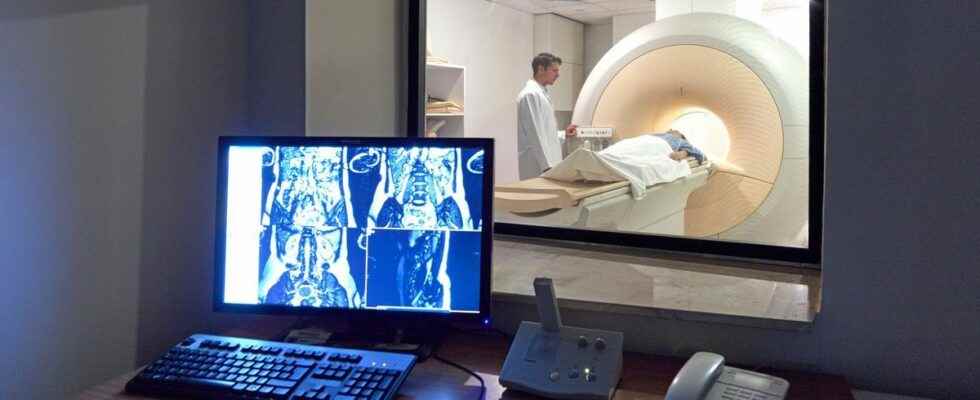Published on
Updated
Reading 4 mins.
When he was told he would not live more than 12 months, a 51-year-old Briton defeated his biliary tract cancer thanks to a clinical trial combining immunotherapy and chemotherapy. An outcome that gives hope to many patients.
It’s a beautiful story that allows you to start the year with hope and courage. According to information The Guardian from December 30, Robert Glynn, a 51-year-old Englishman, who suffered from cancer of the bile ducts and knew he was doomed, succeeded in overcoming the disease thanks to treatment with immunotherapy coupled with chemotherapy. Cancer is now behind him.
Cancer discovered at a very advanced stage
The story begins in August 2020, when the man who lives near Manchester learns that he suffers from cholangiocarcinoma, a cancer of the bile ducts which affects around 2,000 people a year in France. Unfortunately, it is an asymptomatic cancer often discovered late: Robert Glynn discovers both what he is suffering from but also his meager chances of survival.
At the time of diagnosis, his cancer is at stage 4, with involvement of the liver and adrenal glands. “I asked my doctor to be honest with me, and tell me how much time I had left if I continued like this. She told me 12 months” he testifies in the pages of the Guardian.
The chance of a clinical trial
The shock is harsh for the man, but his doctors then direct him to the Christie Foundation, one of the largest cancer treatment centers in Europe. There, he is included in a clinical trial of immunotherapy known to treat lung or kidney cancer, and which now targets the bile ducts. The results of this clinical trial, coupled with chemotherapy, are radical: Robert Glynn’s tumors disappear!
- The one on his liver goes from 12 cm to 2.6 cm;
- The one on his adrenal glands from 7 cm to 4.1 cm.
A reduction which then makes it possible to remove the tumors surgically in the spring of 2022. Since then, no active cancerous cells have been detected. In July 2022, after a CT scan, Robert Glynn was officially declared cured.
Immunotherapy, a cancer treatment that we learn about every day
An additional weapon in the fight against cancer, antitumor immunotherapy presents itself as a new and constantly evolving therapeutic strategy. It consists of using the patient’s natural defences, mobilizing their immune system so that it recognizes cancer cells and destroys them.
For Eric Solary, oncologist and member of the board of directors of the ARC Foundation joined by Doctissimo, the news is to be taken with the satisfaction it deserves:
“This is a known situation in cancer research, this is what is called “exceptional responders”: patients who respond exceptionally well to the implementation of immunotherapy”.
Exceptional responders are a research lead
Beyond the good news for this patient and his family, these rare but reassuring cases of healing have a wider interest in medicine:
“These are not frequent cases, but they allow us to search and understand what is happening. This is the case of a French study carried out by the ARC foundation, it is also the case of a current international study: to seek to collect as many exceptional cases as possible, to analyze them with all the tools at our disposal, to try to find a common mechanism, and improve the response of other patients” enthuses the oncologist.
Thanks to these studies, immunotherapy, which was aimed at its beginnings in 2011 at a certain number of metastatic cancers, sometimes in failure, can now enter the treatment of cancers in first line, when the results are encouraging.
“In ten years of immunotherapy, we have already learned a lot, and we will continue to learn. The whole principle is now to identify the patients who will really benefit from immunotherapy treatment, and not to give it when it is not necessary. We are progressing in this direction to provide the best response on a case-by-case basis”.
Immunotherapy: several treatments currently being tested
According to the ARC, the Cancer Research Foundation, there are currently several possible immunotherapies:
- Non-specific immunotherapy: in which my non-specific immunotherapy drugs stimulate, through cytokines, the overall activity of the immune system, without specifically targeting the tumour;
- The therapeutic vaccine which consists of injecting the patient with components derived from cancer cells. These compounds are capable of triggering an effective immune response against cancer. The process remains to be perfected, but trials are in progress;
- Cell therapy, which allows the patient to be injected with some of their immune cells which have been previously collected and manipulated in the laboratory to act against cancer cells. These modified cells are called CAR-T cells and their injection is used in the treatment of certain types of leukemia and lymphoma;
- Virotherapy, which consists of using modified viruses to attack tumor cells in a targeted manner. The virus then multiplies until it kills the cell it infects, then penetrates into other cancerous cells and continues its lethal action.
- Immunomodulators: in some cases, cancer cells manage to escape immune defences. Immuno-modulation strategies were then put in place aimed at reactivating the immune system, globally (by using interferon or interleukin) or more specifically with checkpoint inhibitors.
Thanks to these advances, the site announces that “the convincing results of numerous clinical trials have led to an acceleration and diversification of research work, exploring ever more therapeutic areas“. Immunomodulators are particularly promising. The first ones on the market are now being tested in more than twenty cancerous locations and sometimes at early stages of the disease. Other immunomodulators are being developed, targeting a growing number of immune cell inhibitors.
